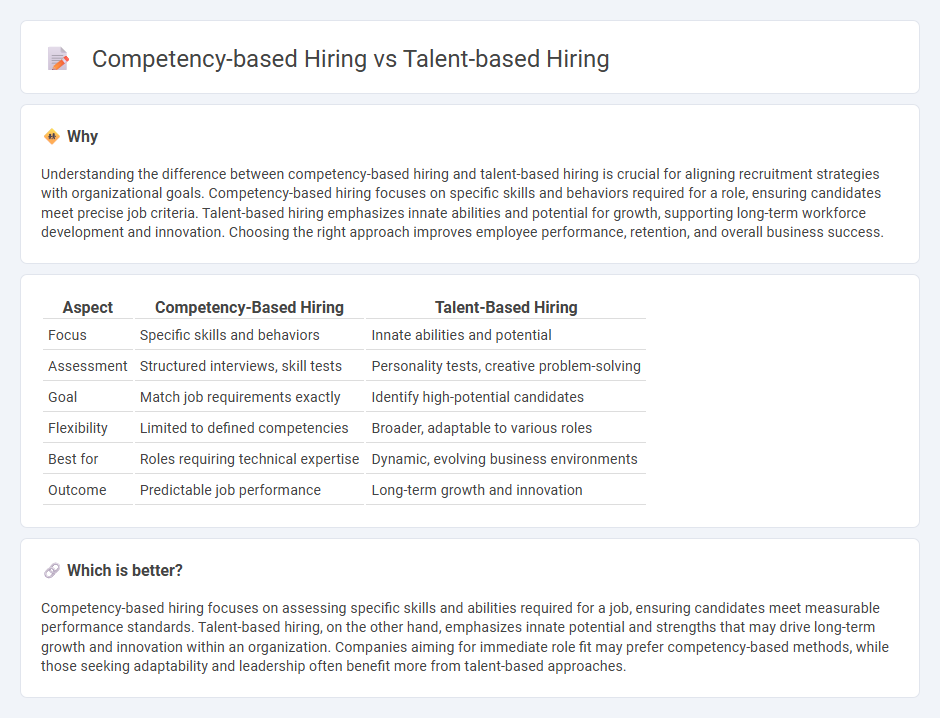
Competency-based hiring focuses on evaluating candidates' specific skills and abilities relevant to job performance, ensuring precise alignment with role requirements. Talent-based hiring emphasizes broader potential and innate qualities that drive long-term growth and adaptability within an organization. Explore the advantages and applications of each approach to optimize your recruitment strategy.
Why it is important
Understanding the difference between competency-based hiring and talent-based hiring is crucial for aligning recruitment strategies with organizational goals. Competency-based hiring focuses on specific skills and behaviors required for a role, ensuring candidates meet precise job criteria. Talent-based hiring emphasizes innate abilities and potential for growth, supporting long-term workforce development and innovation. Choosing the right approach improves employee performance, retention, and overall business success.
Comparison Table
| Aspect | Competency-Based Hiring | Talent-Based Hiring |
|---|---|---|
| Focus | Specific skills and behaviors | Innate abilities and potential |
| Assessment | Structured interviews, skill tests | Personality tests, creative problem-solving |
| Goal | Match job requirements exactly | Identify high-potential candidates |
| Flexibility | Limited to defined competencies | Broader, adaptable to various roles |
| Best for | Roles requiring technical expertise | Dynamic, evolving business environments |
| Outcome | Predictable job performance | Long-term growth and innovation |
Which is better?
Competency-based hiring focuses on assessing specific skills and abilities required for a job, ensuring candidates meet measurable performance standards. Talent-based hiring, on the other hand, emphasizes innate potential and strengths that may drive long-term growth and innovation within an organization. Companies aiming for immediate role fit may prefer competency-based methods, while those seeking adaptability and leadership often benefit more from talent-based approaches.
Connection
Competency-based hiring and talent-based hiring are both focused on identifying candidates' skills, abilities, and potential to excel in a role, ensuring alignment with organizational needs. Competency-based hiring evaluates specific job-related skills and behaviors, while talent-based hiring emphasizes overall aptitude, creativity, and growth potential. Together, these approaches create a comprehensive strategy to improve employee performance and long-term retention.
Key Terms
Skills Assessment
Talent-based hiring emphasizes innate abilities and potential, while competency-based hiring targets specific skills and behaviors demonstrated through past performance. Skills assessment in competency-based hiring ensures candidates meet job-specific criteria by evaluating technical expertise and practical application. Discover how precise skills assessments can transform your hiring strategy for optimal workforce alignment.
Cultural Fit
Talent-based hiring emphasizes innate abilities and potential, often prioritizing raw skills and natural aptitude. Competency-based hiring focuses on demonstrated skills, behaviors, and alignment with the company's cultural values and standards. Discover how emphasizing cultural fit through competency-based hiring can enhance team cohesion and organizational success.
Job Performance
Talent-based hiring emphasizes innate abilities and natural aptitudes that predict potential job success, while competency-based hiring targets specific skills and behaviors demonstrated through past performance relevant to the role. Research shows competency-based hiring aligns closely with improved job performance by identifying candidates who exhibit measurable proficiencies and situational responses needed on the job. Discover how tailoring your recruitment strategy with these approaches can enhance workforce effectiveness.
Source and External Links
Skills-Based Hiring: The Future Of Talent Acquisition - Beamery - Talent-based hiring evaluates candidates by their skills and abilities rather than traditional factors like job titles or degrees, providing a more objective and effective way to find the right people for roles in a competitive market.
What is skills-based hiring? Why hiring based on strengths works - This approach prioritizes skills and strengths over qualifications such as degrees and focuses on matching talent to job needs to improve workforce motivation, performance, and retention.
A Skills-Based Hiring Guide | Parker Dewey - Skills-based hiring emphasizes practical skills and competencies, especially for early-career talent, over academic credentials or experience, helping reduce bias and better assess candidates' potential to succeed.
 dowidth.com
dowidth.com